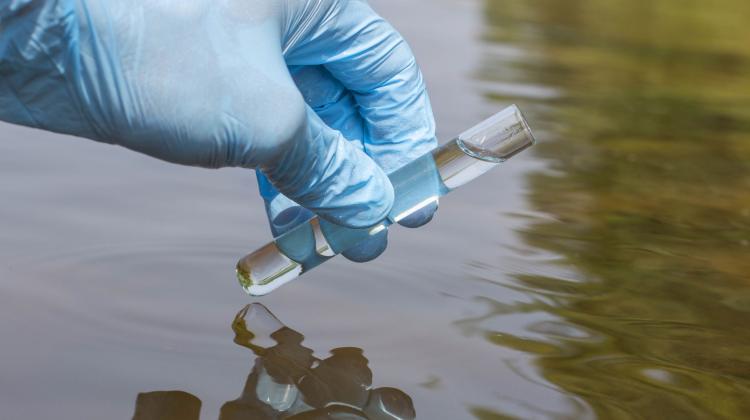Road salt negatively affects spring bloom of zooplankton
 Credit: Adobe Stock
Credit: Adobe Stock
Road salt used in winter has a negative impact on zooplankton, preventing its spring reproduction success, shows Dr. Sebastian Szklarek, an ecohydrologist from the Polish Academy of Sciences. Less zooplankton affects the phytoplankton balance and thus, among other things, a larger bloom of cyanobacteria.
The scientist from the European Regional Centre for Ecohydrology of the Polish Academy of Sciences in Łódź took a closer look at two common species of zooplankton: Daphnia magnaand Thamnocephalus platyurus.
Zooplankton are tiny animal organisms floating under the water surface in water bodies that control the amount of phytoplankton, i.e. microscopic plant organisms found in water, including cyanobacteria. 'If, for some reason, zooplankton develops worse or there is less of it, there may be more frequent or stronger blooms of cyanobacteria,’ explained the promoter of water science and founder of the blog Świat wody ('Water World').
One of the reasons may be excessive salinity of the water body, also due to road salt (sodium chloride NaCl). 'Road salt flows into local freshwater, affecting the entire ecosystem throughout the year. Water bodies located next to smaller rivers fed by runoff from rainfall or snowmelt (rainwater drainage), will dilute this salt after winter to a greater or lesser extent. However, if we have reservoirs fed only by runoff from parking lots or roads, excessive salinity persists much longer and accumulates over the years', Szklarek says.
In his research, the scientist has analysed how the salinity of a water body, caused by road salt runoff, may affect the spring awakening of zooplankton and its spring bloom.
'In short, the impact is negative, although different species respond differently. The species Daphnia magna (water flea), known for its use as food in aquariums, an effective phytoplankton eater, began to hatch sensing spring conditions, but due to the salinity of the water, the process stopped. I assume that either this salt penetrates the eggs, or - when they open slightly - it gets through the holes into the embryo, which dies. Therefore, Daphnia magna does not have a mechanism that would +warn+ against excessive salinity and +tell+ it to wait out these unfavourable conditions,’ Szklarek points out.
The second investigated species, Thamnocephalus platyurus, behaved slightly differently. 'At high salinity, the eggs simply did not hatch. They probably have this +warning+ and +waiting+ mechanism, because after rinsing with clean water, the eggs of this species did hatch,’ the ecohydrologist says.
'The two selected species of zooplankton are model organisms that can be treated as indicators. Therefore, it can be said that the salinity of the water body with road salt has a negative impact on the spring hatching success of zooplankton, which in turn will cause worse water filtration, phytoplankton growth and larger blooms, including cyanobacteria,’ Szklarek says.
The results of his research were published in the journal Ecohydrology & Hydrobiology. The research was carried out in laboratory conditions. Sebastian Szklarek plans to also conduct it in environmental conditions.
The above topic fits into the broader research interests of Dr. Sebastian Szklarek, including the impact of increasing salinity in freshwater ecosystems. 'Last year's disaster on the Oder clearly showed what long-term salinity of water can lead to. Therefore, we need to study these long-term dependencies of the entire ecosystems to be able to predict the directions in which this problem may develop,’ he says.
Road salt used in winter (in the form of sodium chloride NaCl) is still the cheapest, most available and effective agent. Szklarek says: 'There are alternatives, but they are more expensive. However, it is worth asking about long-term environmental costs - if the price of the product included the environmental value lost due to pollution, the use of currently more expensive alternatives would not appear so expensive anymore.’
PAP - Science in Poland, Agnieszka Kliks-Pudlik
akp/ zan/ kap/
tr. RL
Przed dodaniem komentarza prosimy o zapoznanie z Regulaminem forum serwisu Nauka w Polsce.















